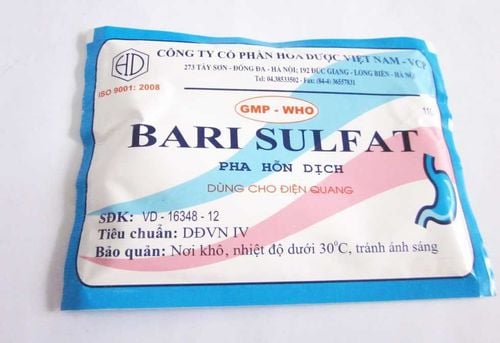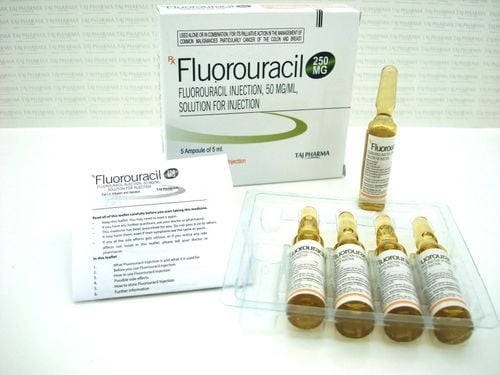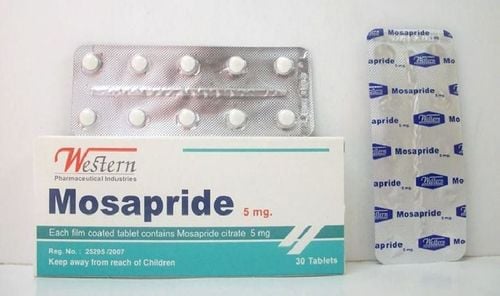This is an automatically translated article.
The article was professionally consulted with Specialist Doctor I Vo Thi Thuy Trang - Gastrointestinal Endoscopy - Department of Medical Examination & Internal Medicine - Vinmec Danang International General Hospital.Gastric ulcer is a common disease, appearing in all ages and regardless of gender. This disease will cause pain, discomfort and can even form advanced stomach cancer if not treated promptly.
1. Gastric ulcers can cause stomach cancer
Peptic ulcer is a condition in which the lining of the stomach becomes inflamed, leading to swelling and the formation of ulcers. There are two types of gastritis: acute and chronic gastritis.Acute gastritis : Is a sudden inflammation in the stomach lining, causing severe pain and in short bursts; Chronic gastritis: An infection of the stomach, causing diffuse or localized lesions in only one area of the gastric mucosa. This can lead to atrophic gastritis. Both acute or chronic peptic ulcers have a great impact on an important part of the body that is doing the macrobiotic task. Peptic ulcers are mainly caused by HP bacteria, this is an open sore with bacteria that can be easily transmitted, so you should not take it lightly.
Especially when chronic peptic ulcer disease will erode the gastric mucosa, causing dysplasia or dysplasia. These are precancerous changes in the cells and will lead to stomach cancer if left untreated.
2. Current rate of peptic ulcers
Among the internal organs of the human body, the stomach plays a very important role in nutrition. Meanwhile, peptic ulcer disease is the most common disease among gastrointestinal diseases. If stomach ulcers are not treated early and properly, they can cause stomach cancer.According to a survey by the Vietnam Association of Gastroenterology, up to 70% of Vietnamese people are at risk of gastritis. Among diseases in the gastrointestinal tract, the rate of peptic ulcer disease accounts for 26% and tends to increase.
3. What causes stomach ulcers? The causes of stomach ulcers include:
Helicobacter pylori: Helicobacter pylori is the leading cause of stomach ulcers. Normally, HP bacteria do not cause problems, but when active it secretes chemicals that can irritate, inflame the inner layer of the stomach and cause ulcers. Unscientific diet: Eating without time, skipping meals, eating at night, eating fast and chewing poorly, eating while working; eat a lot of packaged, processed and fresh foods; spicy, hot, sour foods; A diet lacking in protein and vitamins... are all causes that increase the risk of stomach ulcers and interfere with immune function. Use of pain relievers and anti-inflammatory drugs: Peptic ulcer disease may be more common in older adults who take a lot of anti-inflammatory pain relievers or in people who take these medications for medical conditions. about bones. Stress, prolonged stress: People who are often stressed and worried have a higher rate of stomach ulcers. Because stress weakens the immune system and increases digestive disturbances. At that time, the body is susceptible to harmful bacteria that invade and cause disease, especially HP bacteria. Using stimulants, alcoholic beverages: People who drink too much alcohol can irritate the stomach lining. This leads to inflammation and increases the risk of developing ulcers. On the other hand, when drinking a lot of alcohol can also affect the healing process of existing ulcers in the stomach. Heredity: If someone in your family has peptic ulcer disease, you have a high risk of developing this disease, because it is inherited. people with ulcers and stomach cancer. 4. How does peptic ulcer disease manifest? Symptoms of peptic ulcer disease include:
Epigastric pain: This is a feeling of pain in the upper abdomen, this can be considered the earliest sign of stomach ulcer that you can easily recognize. know. The severity of the pain varies from person to person. The pain can appear at any time of the day even while you are sleeping. Nausea, vomiting: Painful stomach ulcers will easily make the stomach contract stronger, then you will have a feeling of nausea and vomiting due to impaired stomach function. Loss of appetite and loss of appetite : Stomach ulcers make you feel tired, bitter in your mouth, decreased taste, not wanting to eat, not eating well. Gastrointestinal disorders: Gastric ulcers can cause constipation or diarrhea, which is a manifestation of impaired digestive function. Insomnia, sudden weight loss: Diseases related to the digestive tract often cause patients to lose weight quickly. Because it interferes with the body's ability to absorb nutrients. Along with that is fatigue and insomnia. 5. What methods help diagnose stomach ulcers? The following methods are often prescribed by doctors to diagnose stomach ulcers:
Gastroscopy: Currently, this is the most accurate and most used method of diagnosing stomach ulcers. The endoscopy will help the doctor see in detail the condition of the stomach lining, the location of the damage. Based on that to predict the possibility of treatment. Small, new ulcers can be treated medically, but if the ulcer is concave, fibrous, a biopsy will be used to screen for early gastric cancer. Blood and stool test: This test method helps to assess the status of gastrointestinal bleeding complications, the concentration of enzymes secreted from the stomach lining and the status of red blood cells in the stool.
6. How to treat stomach ulcers?
6.1. Drug treatment of stomach ulcers
In the treatment methods of peptic ulcer disease, changes in diet and lifestyle are the decisive factors for the treatment results as well as the prevention of recurrence of the disease. In addition, the use of drugs also helps patients treat effectively.Western medicine: Antibiotics, proton pump inhibitors, H2 receptor antagonists, coating drugs, acid neutralizing drugs are drugs to treat acute and chronic gastritis, used depending on on a case-by-case basis. Traditional Chinese Medicine: Medicines derived from natural herbs are quite benign. These drugs often have few side effects, can be used for a long time, and have a high ability to heal ulcers.
6.2. Stomach ulcer surgery
Surgery is indicated in cases where drug treatment is ineffective or has complications such as pyloric stenosis, bleeding, gastric perforation, emergency surgery...7. Complications of stomach ulcers
Gastric ulcers, if there is no timely intervention method, will cause the following complications:Stomach bleeding: This is the most common complication. Once you have stomach bleeding, it is very difficult to stop. Bleeding will manifest as vomiting blood or black stools. Perforation of the stomach: Occurs when an ulcer penetrates the stomach wall to create a hole that causes severe abdominal pain and requires emergency surgery. Pyloric stenosis: This is a complication that causes severe abdominal pain and vomiting. Stomach cancer: Cancerous gastric ulcer is a very worrying complication. Advanced stomach cancer can cause many dangerous symptoms for the patient. Peptic ulcer is an uncomfortable and persistent disease, but you can completely prevent it by avoiding stress, eating a healthy and scientific diet, getting proper rest, exercising regularly and limiting it. Use antibiotics, anti-inflammatory drugs, pain relievers when not needed.
Please dial HOTLINE for more information or register for an appointment HERE. Download MyVinmec app to make appointments faster and to manage your bookings easily.














